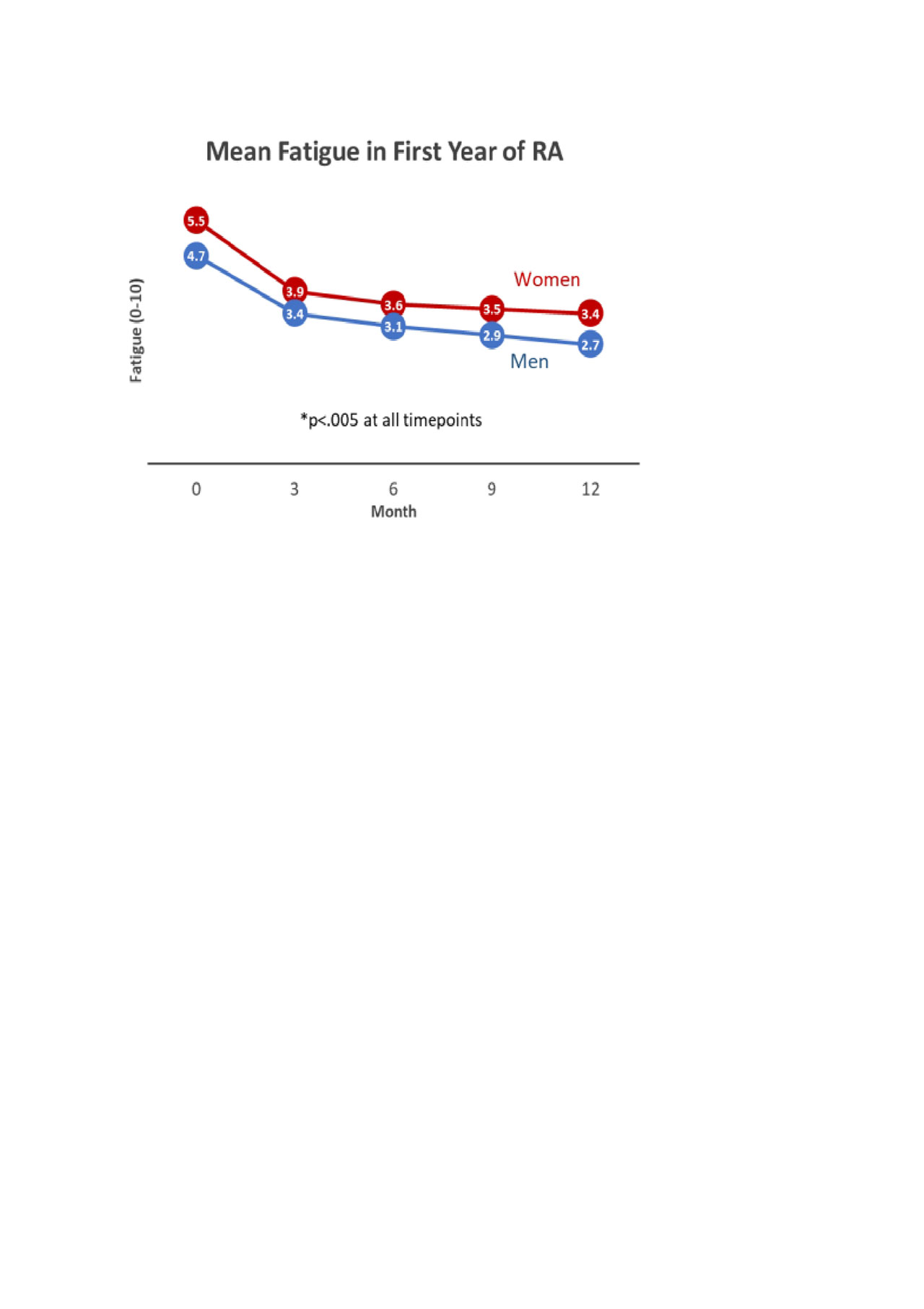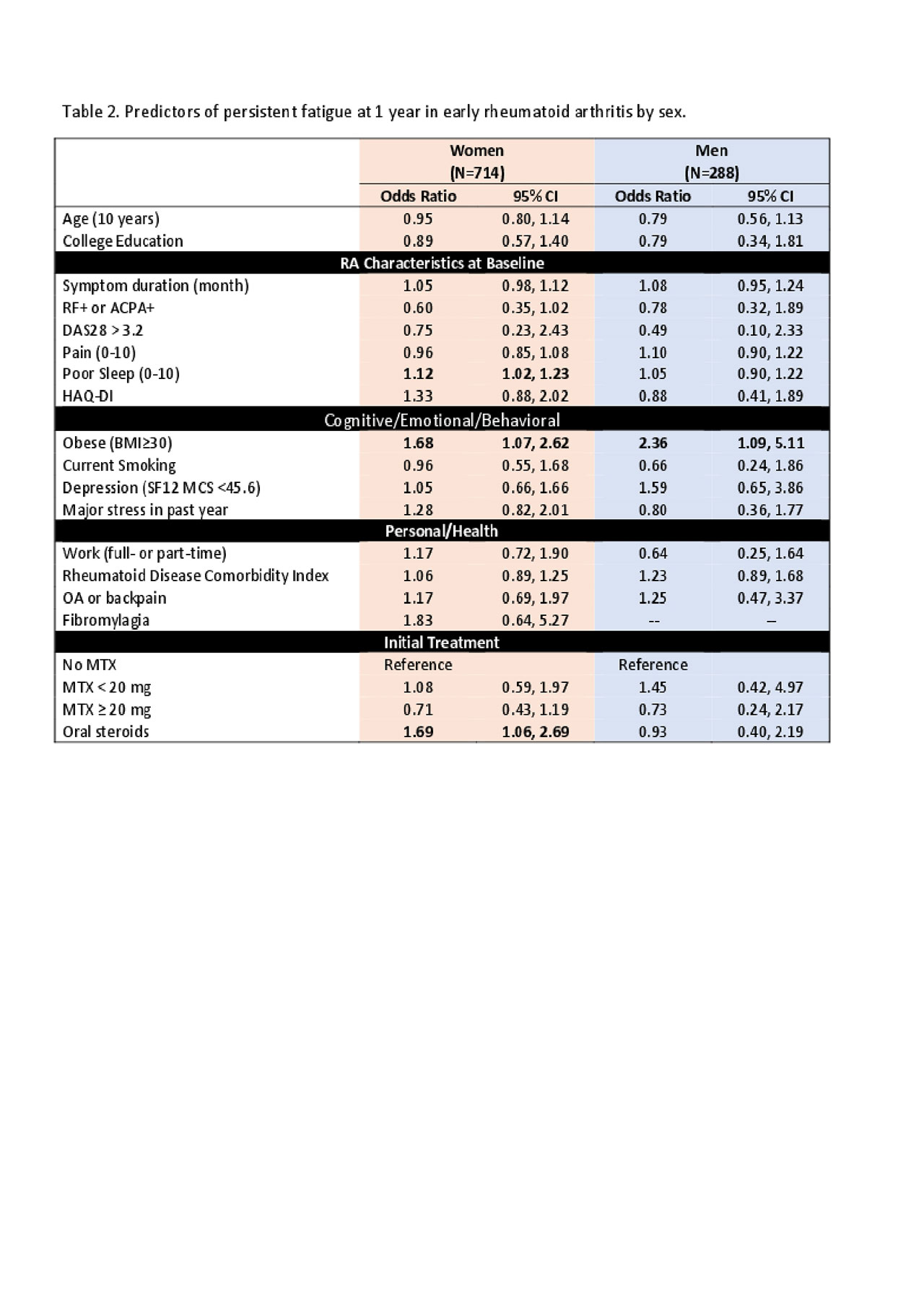Session Information
Date: Sunday, November 10, 2019
Title: RA – Diagnosis, Manifestations, & Outcomes Poster I: Risk Factors, Predictors, & Prognosis
Session Type: Poster Session (Sunday)
Session Time: 9:00AM-11:00AM
Background/Purpose: While treat-to-target strategies can dramatically reduce inflammation in RA, persistently high levels of fatigue are present in many patients and represent an important unmet need. Proposed underlying causes include RA disease activity, cognitive/emotional/behavioral factors (CEB), and personal (health) factors. We identified risk factors for persistent high fatigue at 12 months in women and men with ERA receiving guideline-based treatment.
Methods: Data were from patients enrolled in the Canadian Early Arthritis Cohort (CATCH) between 01-2007 and 03-2017 who met 1987 or 2010 ACR/EULAR RA criteria, had active disease treated with DMARDS, and had complete data on DAS28, BMI, and fatigue severity (0-10) over 12-months. Persistent high fatigue was defined as fatigue ≥ 4 at baseline with < 20% improvement by 12 months. Multivariable logistic regression was used to identify RA disease, CEB, and personal / health factors associated with persistent high fatigue in women and men.
Results: Patients (N=1002) were mostly white (81%), female (71%), with a mean (SD) age of 54 (15), symptom duration of 6 (3) months, and BMI of 28.0 (6.1); 32% were obese (BMI≥30). Women were generally younger, better educated, seropositive, and had greater disability, fatigue, depressive symptoms, and major stress in the year prior to diagnosis (p< .05). 21% of women and 19% of men reported persistent high fatigue throughout the first year (p=.13). Mean fatigue was significantly higher (p< .005) in women at all time points (Figure).
In multivariable regression that included all variables, predictors of persistent high fatigue in women were obesity (OR 1.7; 95% CI 1.1, 2.6), initial steroid use (OR 1.7; 95% CI 1.1, 2.7), seronegativity (OR 0.6; 95% CI 0.4, 1.0) and poor sleep (OR 1.1; 95% CI 1.0, 1.2). In men, obesity was the only significant predictor and was associated with a 2.4 times higher odds (95% CI 1.1, 5.1) of persistent fatigue at 1 yr. Other sociodemographic and RA characteristics, CEB and personal/health factors were not associated with persistent high fatigue in either sex in multivariable models.
Conclusion: Obesity is common in ERA and an important contributor to persistent high fatigue in both women and men. In obese RA patients on guideline-based treatment, lifestyle interventions targeting weight loss may play an important role and strategies to improve mood and manage stress may help reduce persistent high fatigue that does not improve with RA treatment.

Table 1 ACR Predictors by Sex FINAL

Figure Mean fatigue by sex ACR2019

Table 2 ACR Predictors by Sex Final
To cite this abstract in AMA style:
Bartlett S, Schieir O, Valois M, Pope J, Bessette L, Hitchon C, Thorne C, Tin D, Hazlewood G, Boire G, Keystone E, Bykerk V, (CATCH) Investigators C. Obesity Is a Robust Predictor of Persistent High Fatigue at 1 Year in Women and Men with Early Rheumatoid Arthritis [abstract]. Arthritis Rheumatol. 2019; 71 (suppl 10). https://acrabstracts.org/abstract/obesity-is-a-robust-predictor-of-persistent-high-fatigue-at-1-year-in-women-and-men-with-early-rheumatoid-arthritis/. Accessed .« Back to 2019 ACR/ARP Annual Meeting
ACR Meeting Abstracts - https://acrabstracts.org/abstract/obesity-is-a-robust-predictor-of-persistent-high-fatigue-at-1-year-in-women-and-men-with-early-rheumatoid-arthritis/
